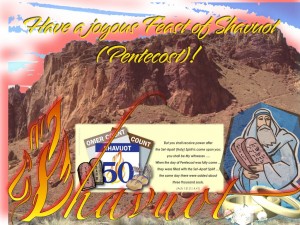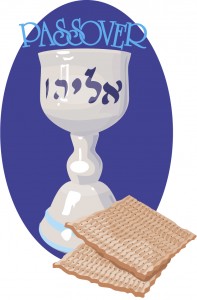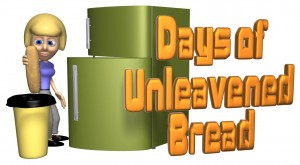The Feast of Weeks (Heb. Shavuot) or Pentecost will be occurring in about a week on Sunday, June 8, 2014. Pentecost is one of the seven biblical holy day Sabbaths that YHVH commands his people to celebrate. Below is a short piece to help you to prepare yourselves spiritually for this set-apart time when YHVH meets with is people in a special way.
A (Re)New(ed) Covenant Involving YHVH Writing Torah on Our Hearts
Jeremiah 31:27–36 prophesies about YHVH making new (or renewed) covenant being with his people Israel, which involves both houses of Israel (the Jews and the Christians) and his writing his Torah on their hearts.

Behold, the days come, saith YHVH, that I will make a new covenant with the house of Israel, and with the house of Judah: Not according to the covenant that I made with their fathers in the day that I took them by the hand to bring them out of the land of Egypt; which my covenant they brake, although I was an husband unto them, saith YHVH: But this shall be the covenant that I will make with the house of Israel; After those days, saith YHVH, I will put my law in their inward parts, and write it in their hearts; and will be their Elohim, and they shall be my people. And they shall teach no more every man his neighbour, and every man his brother, saying, Know YHVH: for they shall all know me, from the least of them unto the greatest of them, saith YHVH: for I will forgive their iniquity, and I will remember their sin no more. (Jer 31:31–34)
Contextually, in the verses surrounding this prophecy we discover some other important details.
- Verse 27, The houses of Judah and Israel were to be mingled throughout the beast nations of the world as punishment for breaking their covenant with YHVH that they made with him on Shavuot (the Feast of Pentecost) at Mount Sinai (Exod 19–20, 24).
- Verse 28, At some point in the future, YHVH’s punishment of Israel for breaking their covenant and their resulting exile among the gentile nations will come to the end. He will rebuild and restore the nation of Israel.
- Verses 29–30, Whereas in times past, Israel was punished as a collective nation for their sins when they disobeyed YHVH and were similarly blessed when they obeyed him, now each person will be cursed or blessed for his own sins. Salvation is more of an individual matter now.
- Verses 31–33, YHVH promises to make a renewed covenant with the two houses of Israel at some time in the future (from Jeremiah’s perspective). It will be different from the covenant he made with Israel at Sinai in two major ways:
- Though it will be a covenant with Israel collectively (both houses), it also will be made with individuals.
- He will deal with the heart of each individual Israelite when he writes his Torah on their hearts.
- Verse 34, This renewed covenant will involve mercy and forgiveness (grace). It will involve a personal relationship between each person and YHVH (“they shall all know me…”).
- Verses 35 and 37, As the sun, moon, stars, the sea, and expanse of the heavens and the earth exist, so YHVH will renew his Torah covenant with Israel. The words of Yeshua in Matthew 5:18 are reminiscent of the this prophecy. Not one yud or tag of YHVH’s Torah will pass as long heaven and earth still exist.
- Verse 36, The very survival of the nation and people of Israel (and hence the fulfillment of the covenants YHVH made with Abraham), is dependent on YHVH regathering and restoring Israel. If YHVH doesn’t bring this to pass, then YHVH is a liar and his Word is a lie and there is no hope for the world! This cannot be!
This was fulfilled during the time of the writing of the Testimony of Yeshua (New Testament). The author of Hebrews talks about this in Hebrews 8. Continue reading →





